MALAYSIAN LIBRARIES’, LIBRARIANS’ AND LIBRARY ASSOCIATION’S RESPONSE TO THE COVID-19 PANDEMIC (as at 24 June 2020)
18 July 2020
Introduction
The press release on Malaysia’s first case of COVID-19 infection was made on 25 January 2020 by the then Minister of Health, Datuk Seri Dzulkefly Ahmad. He confirmed the first case of 2019-nCov (now known as COVID-19) involving three Chinese citizens who had entered Malaysia via Johor from Singapore on 23 January 2020 (Pfordten and Razak Ahmad, 2020). The numbers kept rising and on 16 March 2020, the Prime Minister of Malaysia, Tan Sri Muhyiddin Yassin, announced a 14-day Movement Control Order (MCO) from 18 March 2020 to 31 March 2020 known as Phase 1. However, with no sign of the pandemic abating, the Prime Minister further extended the MCO from 1 April 2020 to 14 April 2020 known as Phase 2 (Bunyan, 2020). On 10 April 2020, the MCO was again extended from 15 April 2020 to 28 April 2020 known as Phase 3. Phase 4 of the MCO was from 29 April 2020 to 12 May 2020.
However, on 1 May 2020, in his Worker’s Day speech, the Prime Minister announced the replacement of the MCO with the Conditional Movement Control Order or CMCO from 13 May 2020 to 9 June 2020 (Mazwin Nik Anis, 2020). The CMCO or Phase 5 was the government’s initial move to restart and reopen the economy. Under the new conditional order, almost all restrictions imposed have been lifted. For example, most restaurants and food courts are allowed to operate, economic sectors and business activities are allowed to operate but under strict stand operating procedures (SOPs). However, schools and religious institutions remain closed and so are libraries. On 7 June 2020, the Prime Minister announced the ending of the CMCO on 9 June 2020. This is replaced by the Recovery Movement Control Order or RMCO from 10 June 2020 to 31 August 2020 (Powera, Adib and Dawn Chan, 2020). This came to be known as Phase 6.
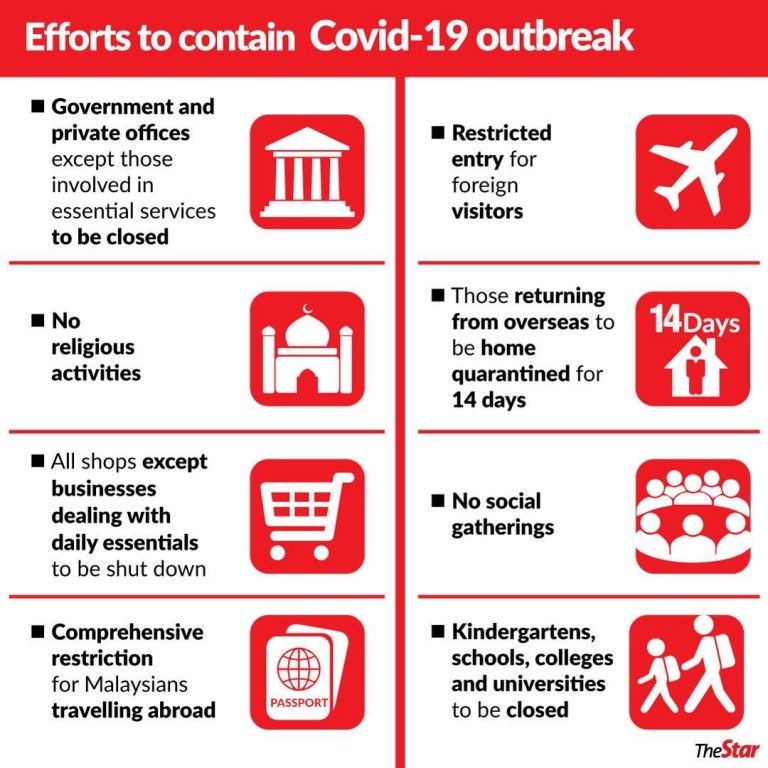
Efforts to contain COVID-19 under MCO as at 18 March 2020
(Source: https://www.thestar.com.my/news/nation/2020/03/17/restricted-movement-for-14-days)
Libraries’ Reactions
Malaysian libraries, both public and private, were quick to react to support the Government’s effort to curb the COVID-19 infection. Perpustakaan Negara Malaysia (PNM) or the National Library of Malaysia announced their full closure and this included all their community and village libraries from 16 April 2020 to right up to the start of Phase 5. In order to fulfil the information needs of Malaysians throughout the MCO, PNM has u-Pustaka (http://www.u-library.gov.my), a digital collection totalling 13.2 million resources u-Pustaka is an information portal to the collection of PNM’s electronic resources. PNM utilises Facebook as a means of communication with Malaysians. There is an unusually high level of activity on Facebook with postings on promotion of reading, instructions on use of u-Pustaka, information from various government agencies, reminders on fake news, tips on staying safe from infection, promotion of libraries services and many more. PNM in collaboration with the Ministry of Tourism and Culture is also organising an essay writing competition. Members of the public are invited to write about their experiences during the MCO.
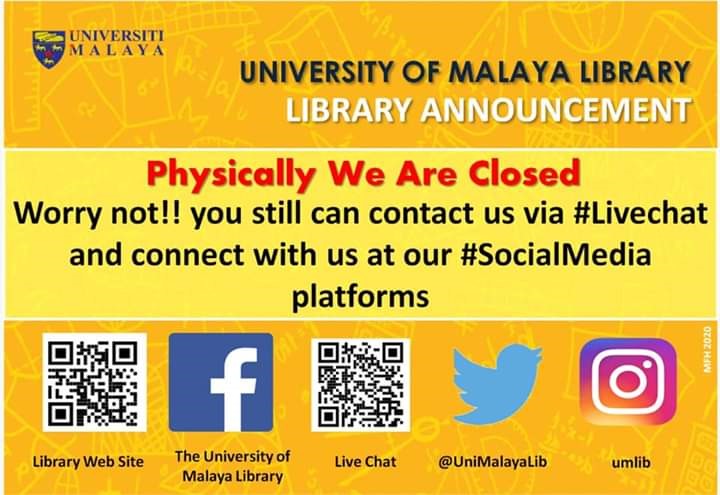
Libraries have issued notice on full closure similar
to that of the University of Malaya Library
(Source: University of Malaya Library Facebook)
All types of libraries – public, community, academic, special – are closed. With their full closure, libraries have to continuously communicate with their users on the use of the respective library’s resources and services. Libraries have to respond positively to the change in mode of interaction with their users. Face-to-face interaction is no longer possible and all these libraries are keeping in touch with their users through a multitude of available digital applications. They need to promote the use of their digital libraries and other appropriate tools since there is a rising interest in digital resources. Libraries that already have a social media presence are actively reaching out to their users 24 x 7. WhatsApp and emails are now a popular mode of communication. There is an increased presence of infographics, online posters and videos on reading promotion, fake news, library services as well as tips and suggestions ranging from how to keep fit to making coffee. Libraries are also actively promoting access to their digital collections. Throughout the years, Malaysian libraries have been building up their digital collections and now is the best time to put them to good use. Chat services and reference enquiries through WhatsApp are now active in most libraries giving rise to a new normal. Libraries are also providing amnesty on borrowed physical books or in other words, the removal of all forms of penalty for late returns.
Throughout the MCO, librarians are working from home. Wherever possible they are putting their existing services online. The University of Malaya Library in Kuala Lumpur has a chat service and they are in contact with their users through various social media platforms. Universiti Teknologi MARA Library in Puncak Alam has a similar service known as Chat with Librarian. Universiti Sains Islam Malaysia Library in Nilai has in place the Ask USIM Library service where users can contact the library via WhatsApp. Universiti Putra Malaysia Library in Serdang uses their mobile application to run the Ask a Librarian service. Universiti Teknologi Malaysia Library opened a Telegram channel and their users can ask questions about their services and access to their resources. Universiti Malaysia Terengganu operates a virtual reference librarian service. Just recently, the Faculty of Medicine, University of Malaya partnered with the University of Malaya Library to run the COVID-19 Evidence Retrieval Service (CERS). Any clinicians with queries on COVID-19 can reach out to a team of evidence-based medical experts, librarians, doctors and medical students. Queries are answered via WhatsApp and the answers to all the questions asked are kept in a data bank accessible to all. Other academic libraries, both public and private, run similar services that allow for online interactions between the librarians and their users.
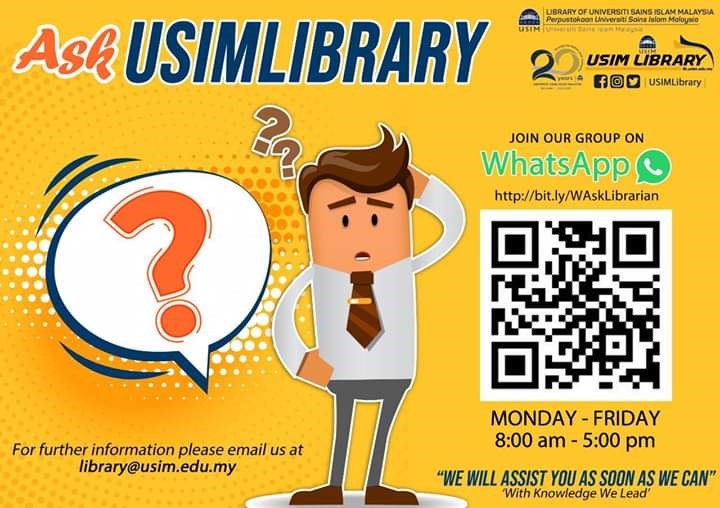
Ask USIM Library service and similar services allow
communication between the libraries and their users
(Source: Perpustakaan USIM Facebook)
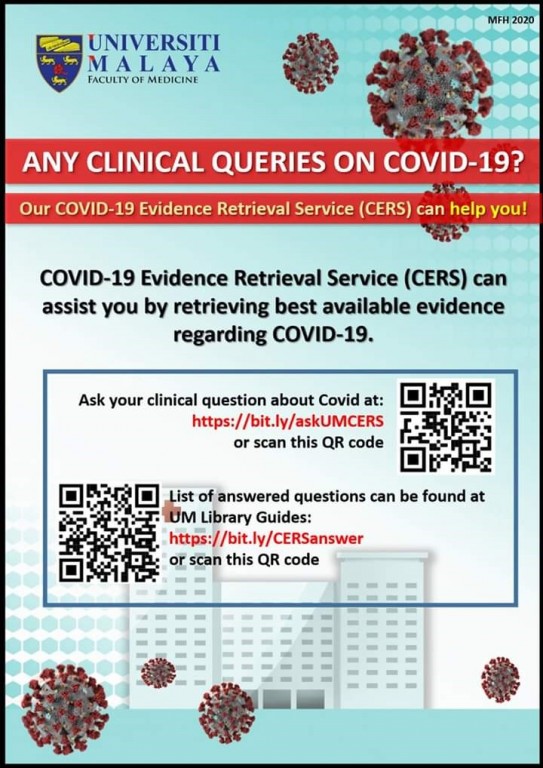
COVID-19 Evidence Retrieval Service (CERS) operated by the Faculty of Medicine, University of Malaya and University of Malaya Library
In their effort to promote reading, the Al-Bukhari Library, Universiti Teknologi MARA (UiTM) Pahang Campus in Jengka organised a competition known as Let’s Read & Share – Let’s Read @College and Let’s Read @Home. All their users have to do is to read, take a photo and tag it to the Library’s Facebook, IG and Twitter. Apart from that the Universiti Teknologi MARA Library organised a number of online forums such as Library Outreach @PTAR 2020, Live @PTAR and webinars. Their tagline Staying Connected: Anywhere, Anytime, Anyone is most timely and appropriate now.
The Pahang and Selangor state libraries have separately donated books to the children’s quarantine centres in their respective states. The former has also donated books to the Pahang State Welfare Department to be given to the homeless. Librarians from Universiti Teknologi Malaysia review books and share them on their Facebook and through YouTube. Similarly, the Perak and Penang state libraries conduct story telling sessions. The Perlis State Library has 31 episodes of i-Baca@Library, a series of videos on topics of interest to the public. Pustaka Negeri Sarawak has made numerous posts on their Facebook such as historical notes on Sarawak, local recipes, book reviews, management of files/records room, live forums and many more. Other public libraries are also actively using their social media platforms for similar activities. We also see an increase in online activities from perpustakaan desa or village libraries or rural community libraries. Numerous perpustakaan desa are interacting with their users through their Facebook with quizzes, riddles, advice and information sharing.
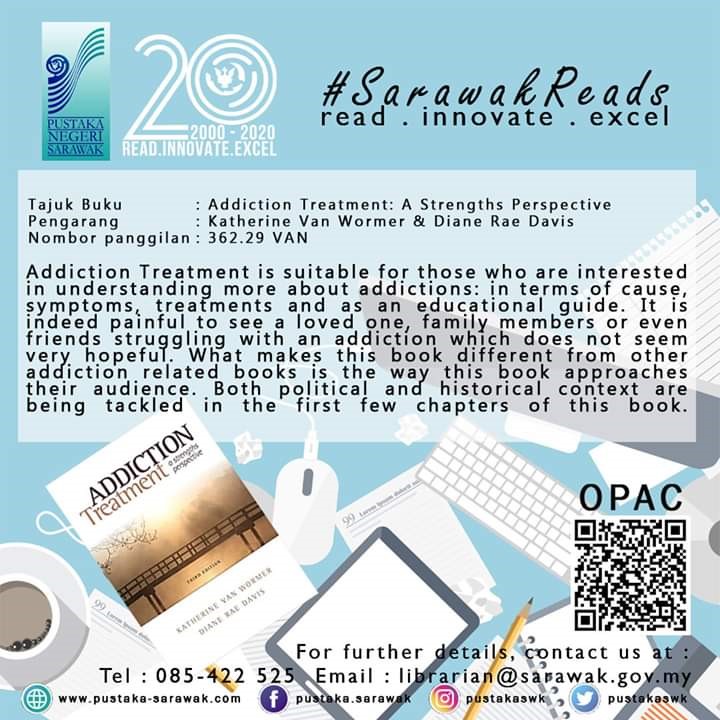
Pustaka Sarawak provides summaries of selected books
(Source: Pustaka Sarawak Facebook)
Special libraries serve the information needs of their organisation. Complying to the MCO, the librarians have to work from home and like other libraries, they need to communicate with their users and provide them access to information. They also need to provide their resources and services digitally. Hashimah Yusoff, the Head of the Resource Centre, Ministry of Communications and Multimedia Malaysia said that among the service the Centre undertakes are online book reviews, Jom Baca e-Buku/Let’s Read e-Books, virtual exhibition on guide to home libraries, sharing information on COVID-19 through various social media platforms, reference enquiries, compiling the Prime Minister’s speeches and information packaging in the form of infographics on COVID-19. The Head of Knowledge Management of CyberSecurity Malaysia, Zaleha Abd. Rahim said that they disseminate information daily to their users. They have Pick-of-the-Week, K-Brief, Jom Baca/Let’s Read, What’s New and K-share. They also have requests from their users to search for specific information and to purchase books. The PETRONAS Resource Centre maintains all its services on their digital platform except for physical loan of resources. The Chief Librarian, Norhayati Abdul Malek said this includes services such as the online reference, document delivery, access to e-books and e-newspapers, daily updates of news articles, information packaging especially on COVID-19, online training sessions such as records management, access to webinars, promotions and advertisements through e-posters, She has also noted that throughout the MCO, usage statistics are still high, indicating that the Centre is still relevant even when every one is working from home.
With almost every school in Malaysia closed during the MCO, school librarians are also working from home. They conduct online classes on book discussion and e- NILAM courses whereby NILAM is the Ministry of Education Malaysia’s initiative to encourage reading amongst primary and secondary school students. The school librarians also attend online courses on school resource centers organised by the Resource and Educational Technology Department of the Ministry of Education Malaysia. Individually, the school librarians promote reading through various social media and communications platform They also update the NILAM records for their schools.
These are some of the many ways the Malaysian libraries and librarians are engaging themselves with their users and the public at large. Numerous libraries are now hosting talk show on a regular basis. Most of these talk shows focus and libraries and librarians.
Since all the library staff are working from home, the only form of communication amongst them is through WhatsApp, emails, telephone calls and other available mode of communications. Meetings are conducted online using various online meeting applications. This seems like an opportune moment for Malaysian libraries to explore the features of various online meeting platforms and use the ones that suit their requirements.
Some libraries are making their library space and equipment available for other activities. Libraries with 3D printers are partnering with individuals who have 3D printers to produce face shields. Universiti Malaysia Perlis Library in Arau made face shields for their University’s front liners. The Library then collaborated with the Student Affairs Department and the Centre of Excellence for Advanced Sensor Technology (CEASTech) to produce 100 face shields daily for a hospital in Kangar. This is a corporate social responsibility project for their students who are staying on campus during the MCO. The Kedah Public Library shared their 3D printer with the School of Computer and Communication Engineering (SCCE), Universiti Malaysia Perlis to produce face shields for front liners in Kedah and Perlis. The Universiti Malaysia Kelantan Library in Bachok was also involved in producing face shields with their university as well. Pustaka Negeri Sarawak in Miri produced face shields for medical front liners at Miri Hospital and other health centres there.
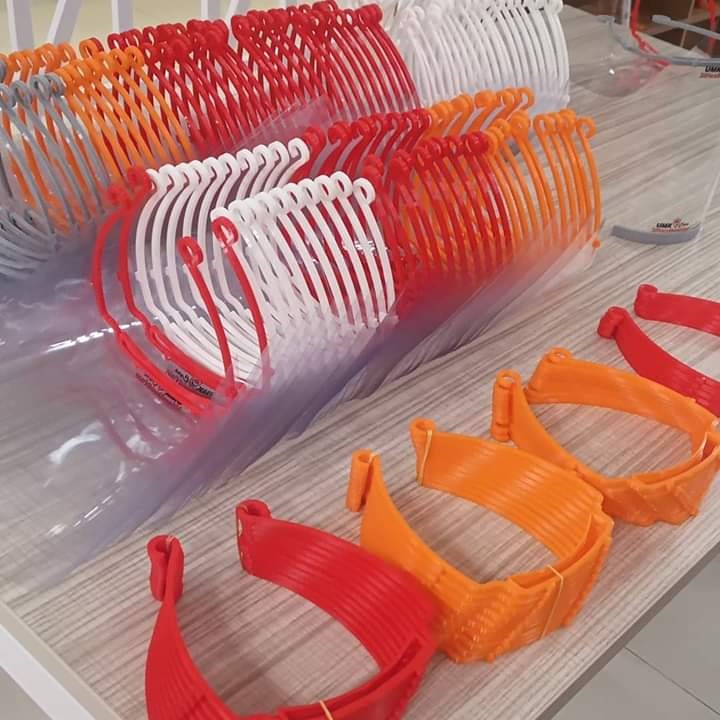
Libraries are assisting in the production of face shields
(Source: Amirul Firdaus Bin Zilah Facebook)
LIBRARIANS’ REACTIONS
Librarians throughout Malaysia, individually or collectively, have been doing various activities and projects. Sembang Pustakawan is a Facebook group that was created by a group of librarians as a platform for the library and information science community to communicate, share, discuss, make requests and promote events that are library and information science related. This group has been attracting not only librarians but also library and information science students, academics, other professionals as well as publishers and library vendors. Since the enforcement of the MCO, the number of posts on their Facebook has gone up considerably. Librarians are posting questions and providing solutions to issues related to working from home. They have been sharing tips on how to go about their daily lives as librarians from home and not from their offices.
Another group of young librarians comprising of Amirul Firdaus Zilah from Universiti Malaysia Kelantan, Dr. Mohd. Faizal Hamzah from University of Malaya, Mohd. Ikhwan Ismail from Universiti Sains Malaysia and Nurul Diana Jasni from Universiti Teknologi MARA, formed Librarian I.D.E.A.S. (Information, Dissemination, Expertise, Amazing, Success). The group organises online forums with a moderator and three invited panellists. To date, the group has organised eleven forums. The first was on 24 March 2020 on the role of librarians during the MCO and the latest was on 20 June 2020 on the readiness of library services to operate. These forums are conducted in the Malay language primarily for the local audience and Malay speaking countries except for the tenth session which featured Sue Owen from Australia’s Federation University. Through these forums, librarians come together and discuss a wide range of issues related to the profession.
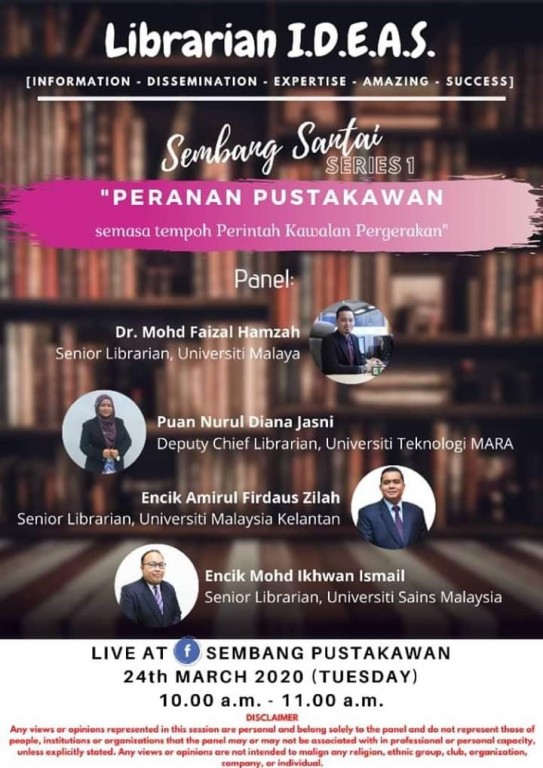
Librarian I.D.E.A.S. Series 1
(Source: Librarian IDEAS Facebook)
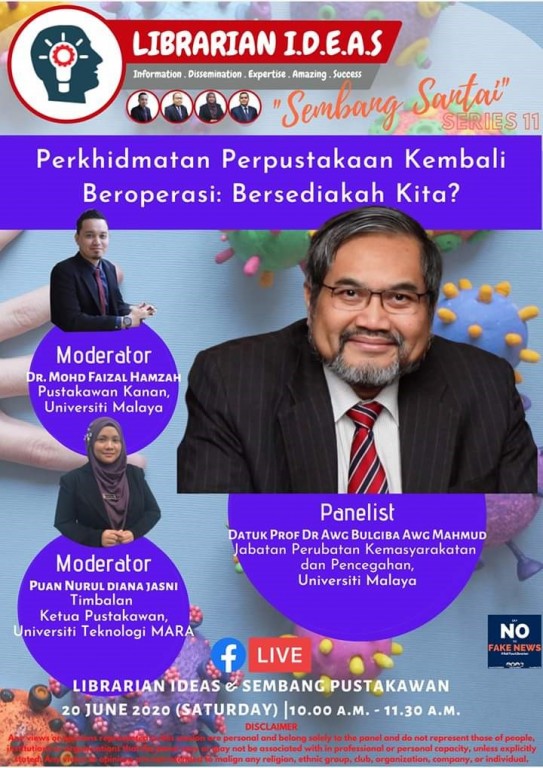
(Source: Librarian IDEAS Facebook)
Individual librarians are also contributing to the pool of resources and creating contents for their users through their personal social media and YouTube accounts. Mohd. Ikhwan Ismail from Universiti Sains Malaysia and Nurul Diana Jasni from Universiti Teknologi MARA Puncak Alam produce videos on information literacy and use of various databases. Nurfarawahidah Badruesham from Universiti Teknologi MARA Jengka holds online forums with invited speakers for discussions on various matters. Nor Azzah Momin from Universiti Sains Islam Malaysia regularly posts reviews of books that she has read. Noraini Abd. Rahman from the Kedah State Library posts a summary of daily statistics on COVID-19 infection in Malaysia in terms of number of new cases, number of discharges, number of deaths and total number of infections. These are statistics gathered from official sources. Dr Diljit Singh, a retired University of Malaya professor and a member of the IFLA Journal Editorial Committee, has offered his assistance to help those who are interested in conducting any research that will lead to the publication of an article in a journal. Dr. Ghazali Mohd. Fadzil, a retiree whose expertise is in the field of knowledge management, is testing various online meeting applications by sharing his train travels and book reviews. The writer herself has been actively putting out postings on fake news, social media and writing. There are a number of active and retired librarians who are playing their part in the delivery of information to the public through various social media platforms.
Librarians, LIS academics and students are also taking the opportunity to gather information on the information seeking behaviour of Malaysians during this time. Dr. Mohd. Faizal Hamzah and Dr. Ranita Hisham Shunmugam who are librarians from the University of Malaya Library have partnered with Ts Muhamad Afiq Faisal Yahaya from University of Manchester and Bairave Shunmugam from the Faculty of Medicine, University of Malaya to conduct an online Survey on the Information Seeking Behaviour of Malaysians During the COVID-19 Crisis and Fake News Phenomenon. Dr, Samsul Farid Samsuddin from the Department of Library and Information Science, Faculty of Computer Science and Information Technology, University of Malaya followed with a Study on Perceptions and Attitudes in Covid-19 Information Seeking Related Among Malaysian. A group of lecturers from the Faculty of Information Management, Universiti Teknologi MARA Kedah, Noryana Ahmad Khusaini, Zuraidah Arif, Dr. Abd. Latif Abdul Rahman, Dr, Siti Khairunnisa Sheikh Abdul Mutalib and Zati Atiqah Mohamad Tanuri also uploaded an online survey titled Corak Perkongsian Ilmu di Kalangan Rakyat Malaysia Menggunakan Media Sosial Khusus Pada Waktu Perintah Kawalan Pergerakan Ketika Penularan Wabak COVID-19 / The Pattern of Information Sharing Amongst Malaysian Using Specific Social Media During the Movement Control Order for the Spread of the COVID-19 Infection. James Oluwaseyi Hodonu-Wusu, a postgraduate student from the Department of Library and Information Science, Faculty of Computer Science and Information Technology, University of Malaya, partnered with four other colleagues for a study on Information Literacy Skills, Awareness, and Attitude of Librarians Towards Disseminating COVID-19 Pandemic Information. His partners are Lazarus Gift Nneka from Babcock University, Nigeria; Ishola Bolanie Clifford from Federal Polytechnique Ede, Nigeria; and Hellen Mbotela from Turkana County Assembly, Kenya. Another online survey that has yet to be launched is from Noraini Abd. Rahman from the Kedah State Library with Noryana Ahmad Khusaini and Mohd. Shamsul Daud from Faculty of Information Management, Universiti Teknologi MARA Kedah. The title of the survey is Penggunaan Media Sosial di Perpustakaan Akademik, Institusi Pengajian Tinggi Awam (IPTA) Malaysia Semasa Perintah Kawalan Pergerakan (PKP) COVID-19 / The Use of Social Media in Academic Libraries, Malaysian Public Higher Education Institions (PHEIs) During the Movement Control Order (MCO) COVID-19.
PERSATUAN PUSTAKAWAN MALAYSIA’S REACTIONS
Persatuan Pustakawan Malaysia (PPM) or the Librarians’ Association of Malaysia is actively using their various social media platforms during this time. Through their Facebook, various information about COVID-19 are posted. Members are also encouraged to write about their working from home experiences and to share steps taken by their libraries and themselves as librarians during the MCO. These writings are in Berita PPM/PPM News (https://beritappm.wordpress.com), the official newsletter of the association. PPM also launched a Telegram channel know as Buletin PPM which is used to feed library and librarian-related news as well as news on the current COVID-19 situation. PPM has also partnered with Persatuan Biblioterapi Malaysia (PERBIMA) or the Bibliotherapy Association of Malaysia to organise various contests and activities related to bibliotherapy during the MCO.
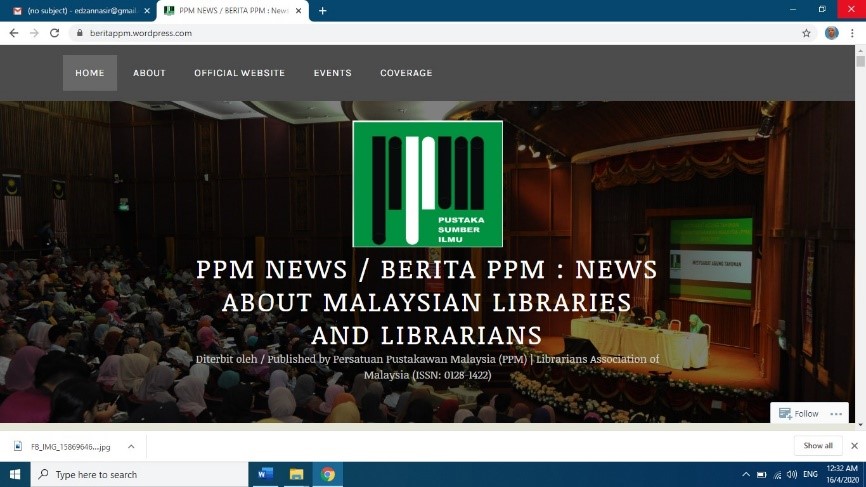
Berita PPM/PPM News: PPM’s online newsletter
The PPM Council members met online for the first time on 11 April 2020 and 18 April 2020 as well as 16 May 2020. Like the others, PPM is also exploring the best online meeting applications that can be used throughout the MCO. Various matters were discussed and almost all of the Council members felt that they should meet every week to discuss and deliberate on matters that might arise throughout the MCO. It is interesting to note that PPM was suppose to hold its Annual General Meeting (AGM) on 25 March 2020 and at the same time announce the results of the 2020/2022 Council election. However, the Registrar of Societies has banned all societies from holding any activity until the end of June 2020 (Bedi, 2020). PPM is now preparing for their AGM which will be held on 25 July 2020.
Fake news is in abundance nowadays and PPM has decided to use #librariansfilterfakenews and #pustakawantapisberitapalsu to bring awareness to Malaysians on the danger of spreading fake news. IFLA has released the Malay version of the COVID-19 edition of How to Spot Fake News infographic. This infographic will be widely circulated to PPM’s members. In order to gauge and document the activities of the public, academic and special libraries throughout the MCO, PPM will conduct online surveys. The results will be analysed and made public. PPM is also planning to organise a number of online courses.
To this end, the Medical Library Group of PPM has produced a guideline on library operations post-MCO to ensure that an exit strategy is in place once the MCO is lifted. The Guideline for Library Operations Post-Movement Control Order/Garis Panduan Pengurusan Operasi Perpustakaan Pasca Perintah Kawalan Pergerakan (PKP) is written in both the Englsih and Malay languages. The Standing Committee on School Resource Centre of PPM also published their own guideline for schools known as Garis Panduan Pengoperasian Pusat Sumber Sekolah Pasca Peraturan Kawalan Pergerakan. However, this guideline is only published in the Malay language.
PPM recognises that there are pockets within the Malaysian population that do not have access to the Internet. This group of Malaysians will not be able to access digital resources such as u-Pustaka and other online databases. They will still rely on printed sources. Therefore, PPM will be buying books which will be given to these communities.
Two major events took place on 23 April 2020. The first was the nationwide reading initiative Jom Baca/Let’s Read where all Malaysian were invited to read at 11.00 am and the other was the launch of the Kuala Lumpur World Book Capital 2020. PPM is the co-organiser for the former and IFLA for the latter.
On 6 June 2020, librarians and information professionals celebrated their Hari Pustakawan or Librarian’s Day. PPM initiated this special day in 2015 and 6 June is chosen to commemorate the day the Malayan Library Group, the forerunner of PPM and the Library Association of Singapore, was registered as an association at the Registrar of Societies in Singapore on 6 June 1955. The theme for this year’s celebration is #stayingrelevant #tetaprelevan. PPM organised an online forum on the memorable day featuring two Council members, Dr. Rashidah Bolhassan and Dr. Ghazali Mohd. Fadzil who presented their thoughts and views on the theme #stayingrelevant. But the highlight of the day was definitely the congratulatory message from the Minister of Tourism, Arts and Culture, Dato Sri Hajah Nancy Shukri. She wished all librarians and information professionals a Happy Librarian’s Day and most importantly acknowledged the important role played by librarians during the MCO.
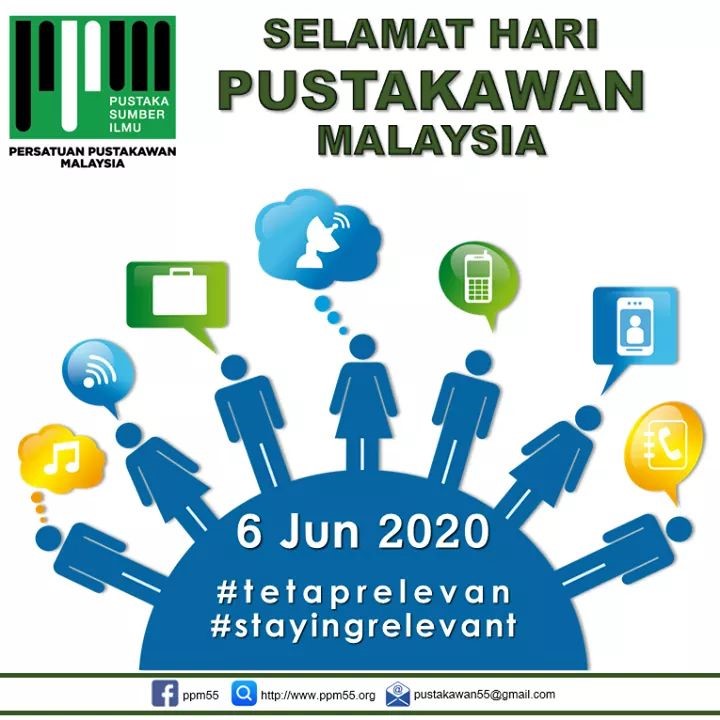
E-poster for Librarian’s Day 2020
(Source: PPM Facebook)
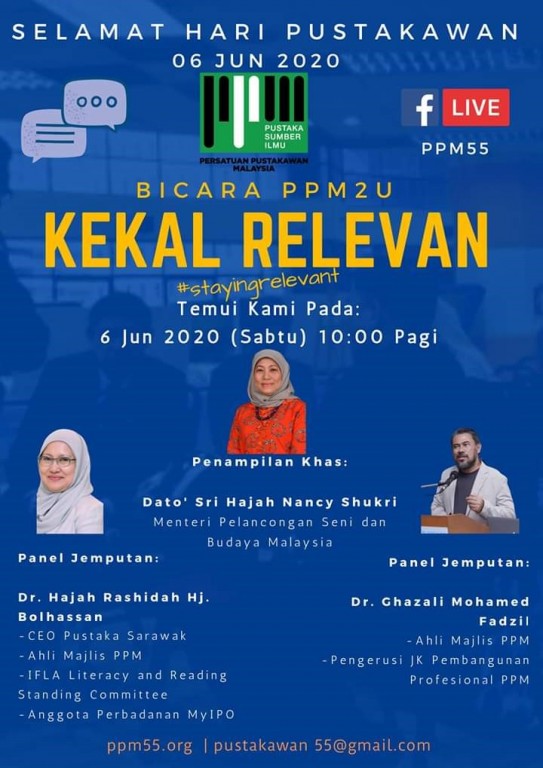
PPM2U Forum on 6 June 2020
(Source: PPM Facebook)
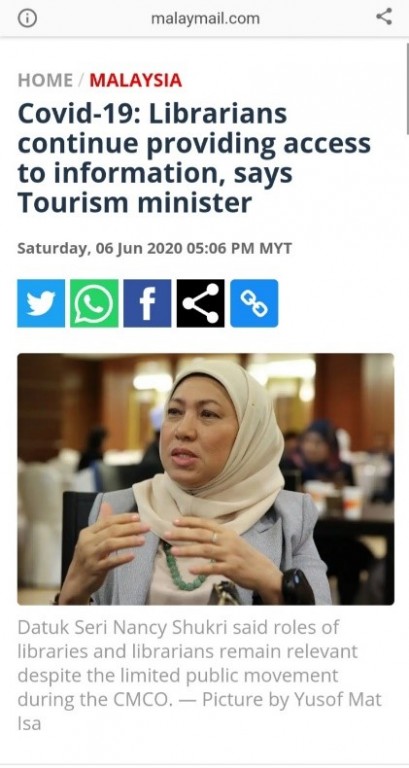
News report on Minister of Tourism, Arts and Culture Malaysia
(Source: https://www.malaymail.com/news/malaysia/2020/06/06/covid-19-librarians-continue-providing-access-to-information-says-tourism-m/1873052)
The Sarawak Chapter of PPM in collaboration with the Sarawak State Library organised the 4th Sarawak Librarians Colloquium on 6 June 2020. For the first time ever, the Colloquium was conducted online with four oral presentations, four poster presentations and a forum. The theme for the Colloquium was Librarian. Connect. Community.
REOPENING OF LIBRARIES
With the announcement of the commencement of the RMCO, libraries, resource and information centres began cleaning, sanitising and preparing for the reopening of their libraries and information centers. Staff are back at the office but on a rotational basis and therefore not in full force. However, when the libraries open their services to the users, all staff have reported for duty and are no longer working from home.
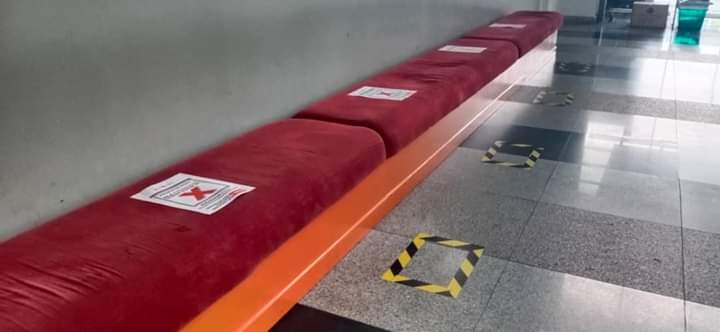
Sanitising at the Selangor State Library
(Source: Perbadanan Perpustakaan Awam Selangor Facebook)
The Resources Centre of the Ministry of Communications and Multimedia reopened on 18 May 2020 and relied on the guidelines of the reopening of libraries from IFLA, PPM and PNM. PNM reopened its services to the public from 16 June 2020. The Library operates shorter hours and is closed over the weekends and on public holidays. The children’s section still remains close. Libraries under PNM began operations on either 15 June 2020 or 16 June 2020.
The staff of Universiti Tun Hussein Onn Library came back to work on 2 June 2020. Universiti Utara Malaysia Library began operations to the on-campus community on 7 June 2020 with Universiti Sains Malaysia Library starting its operations from 9 June 2020. Similarly, Universiti Kebangsaan Malaysia Library was from 17 June 2020. Universiti Putra Malaysia Library only allowed for book returns from 10 June 2020 to 30 June 2020. From 1 July 2020 to 31 August 2020, the Library will only open certain sections of the Library. Universiti Teknologi MARA Library reopened its doors on 10 June 2020.
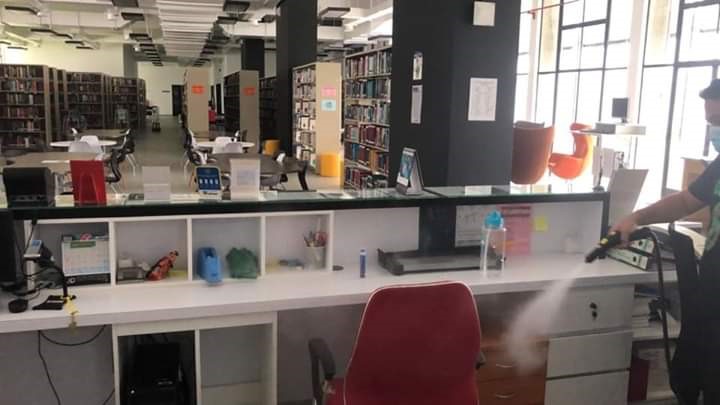
Sanitising at University of Malaya Library
(Source: University of Malaya Library Facebook)
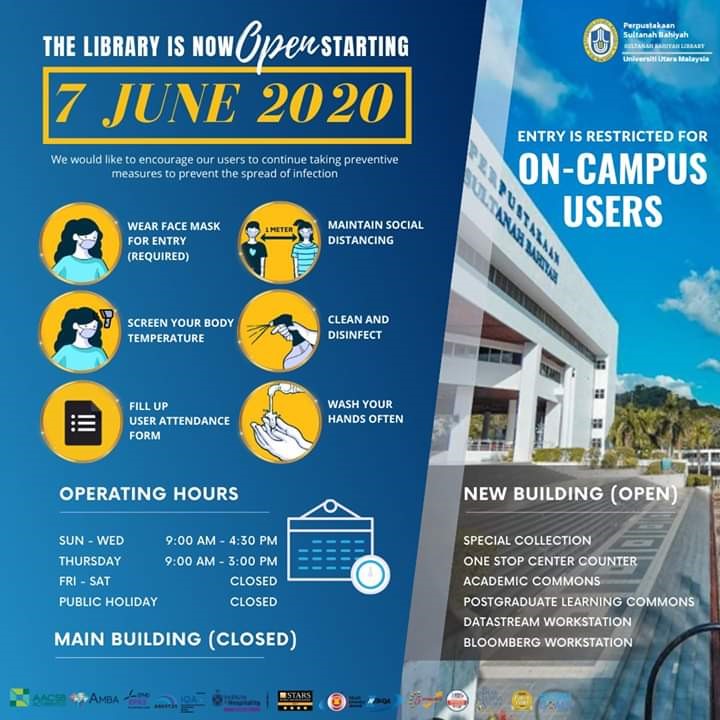
Announcement on the reopening of the Universiti Utara Malaysia Library
(Source: Perpustakaan Sultanah Bahiyah Facebook)
Public libraries within the various states in Malaysia are also reopening their libraries. The Pahang State Library opened all their state, district, branch, community and village libraries on 15 June 2020. Similarly, the Melaka State Library and the many libraries under them will open on 22 June 2020. The Selangor State Library opened its doors to their users on 15 June 2020.
All in all, libraries are slowly but surely reopening their libraries to their users but adhering to strict SOPs. Their opening dates stagger depending on the amount of preparation they have to undertake. In order to safeguard the health of young children, the public libraries do not allow children below 12 to enter the libraries. School teachers received instructions to be back at school from 7 or 8 June 2020 depending on the state they are in. From 24 June 2020, all school teachers have to be in school. However, school resource centers remain closed. Schools will be reopening in stages with classes sitting for national examinations and its equivalent reopening on 24 June 2020.
CONCLUSION
The duration of Malaysia’s MCO from 18 March 2020 to 31 August 2020 is 167 days. Whether it will be extended further or otherwise, only time will tell. Throughout the various phases of the MCO, libraries and librarians have done and is doing their best to fulfil the information needs of their users and the public at large. The full closure of libraries and information centres is unprecedented and this is definitely a first for most if not all of of us. However, we are now seeing a gradual reopening of the various types of libraries but under strict SOPs.
In discharging their duties during the MCO, libraries and librarians need to have an exit plan or an exit strategy or a post-MCO strategy. What are the necessary steps that should and need to be taken for the libraries to function as before or can the libraries function as before? The experiences of librarians who worked from home have to be documented and analysed accordingly. Questions about the ability of a library’s digital infrastructure to support digital resources and services have to be addressed. Similarly, questions on the the provision of sufficient tools and equipment for the staff to work from home need to be answered as well. There is an urgent need for a disaster preparedness plan for Malaysian libraries and librarians. PPM as a library association has an important role to play and has to address its role accordingly.